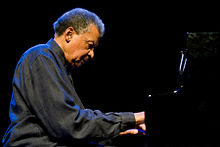Abdullah Ibrahim
| Abdullah Ibrahim | |
|---|---|

Ibrahim performing at the 2011 Moers Festival
|
|
| Background information | |
| Birth name | Adolph Johannes Brand |
| Also known as | Dollar Brand |
| Born |
9 October 1934 Cape Town, South Africa |
| Genres | South African jazz, bebop, post-bop, folk |
| Occupation(s) | Musician, composer, bandleader |
| Instruments | Piano, saxophone, cello |
| Years active | 1955–present |
| Associated acts | Sathima Bea Benjamin, Jean Grae |
| Website | abdullahibrahim.co.za |
Abdullah Ibrahim (born Adolph Johannes Brand on 9 October 1934 and formerly known as Dollar Brand) is a South African pianist and composer. His music reflects many of the musical influences of his childhood in the multicultural port areas of Cape Town, ranging from traditional African songs to the gospel of the AME Church and ragas, to more modern jazz and other Western styles. Ibrahim is considered the leading figure in the subgenre of Cape jazz. Within jazz, his music particularly reflects the influence of Thelonious Monk and Duke Ellington. He is known especially for "Mannenberg", a jazz piece which became a notable anti-apartheid anthem. With his wife, the jazz singer Sathima Bea Benjamin, he is father to the New York underground rapper Jean Grae, as well as to a son, Tsakwe.
Ibrahim was born in Cape Town on 9 October 1934, and was baptized Adolph Johannes Brand. He attended Trafalgar High School in Cape Town's District Six, and began piano lessons at the age of seven, making his professional debut at 15. He had a mixed racial heritage, making him a coloured person according to the South African government. His mother played piano in a church, the musical style of which would remain an influence; in addition, he learned to play several genres of music during his youth in Cape Town, including marabi, mbaqanga, and American jazz. He became well known in jazz circles in Cape Town and Johannesberg. In 1959 and 1960, Ibrahim played with the Jazz Epistles in Sophiatown, alongside saxophonist Kippie Moeketsi, trumpeter Hugh Masekela, trombonist Jonas Gwangwa, bassist Johnny Gertze and drummer Makaya Ntshoko; in 1960, the group recorded the first jazz LP by Black South African musicians. Ibrahim then joined the European tour of the musical King Kong. Although the group avoided explicitly political activity, the apartheid government was suspicious of it and other jazz groups, and targeted them heavily during the increase in state repression following the Sharpeville massacre, and eventually, the Epistles broke up.
...
Wikipedia
